Brainstorm - My Life With Epilepsy
(German Version below)
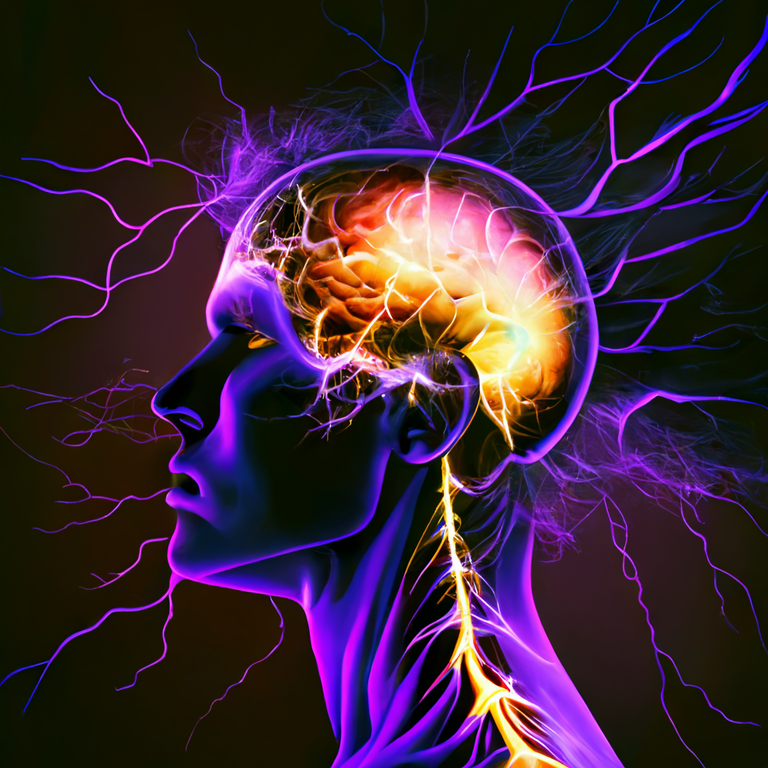 (AI picture generated by Mafu Fuma)
(AI picture generated by Mafu Fuma)It has been 4 years now. I just fell down and lay on the floor with twitching legs and arms. Medical diagnosis: suspected epilepsy.
However, a single seizure does not mean that one is immediately an epileptic. A diagnosis of epilepsy usually requires at least two seizures with no known trigger (unprovoked seizures) at least 24 hours apart.
I had no memory of my seizure and no injury, so didn't want to believe it had happened, but shortly thereafter the 2nd seizure followed and someone took a picture. I had to face my new reality. I am an epileptic.
Epilepsy is a neurological disorder characterized by recurrent seizures that can severely impact a person's life. As someone who suffers now since 4 years from epilepsy myself, I know how difficult it can be to deal with this disease and the mental health issues that come with it.
It's really hard to deal with the unpredictability of the seizures, and it also affects your ability to work, socialize and live your life freely. Sometimes I feel like people don't understand what someone with epilepsy goes through, and it often makes you feel even more isolated. This is the reason why I am writing this article. To better handle my disease itself and maybe the attitude of the society towards the disease epilepsy will also change a bit, because the opinions in the minds are largely based on ignorance and prejudice.
Unfortunately, epilepsy currently has no cure and treatments for epilepsy are limited to medications designed to prevent seizures by regulating electrical activity in the brain. Finding the right medication, however, is a process of trial and error, as different medications can have different side effects on different people, affecting mental health. For example, some medications can cause fatigue, depression and severe mood swings, which can make it even more difficult to cope with the challenges of epilepsy.
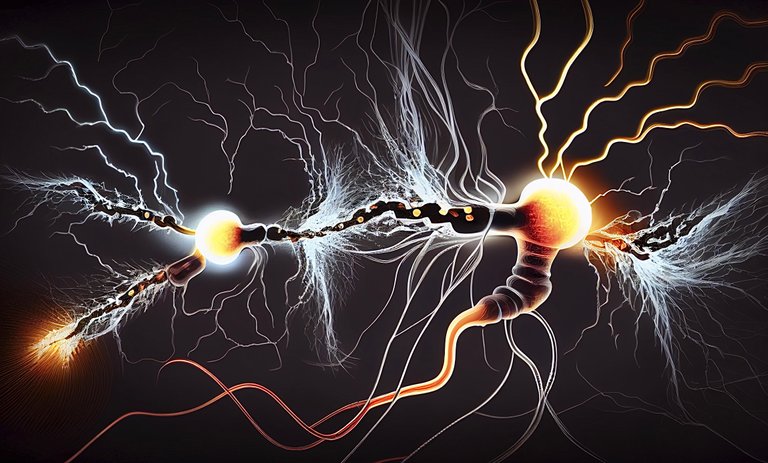 (AI picture generated by Mafu Fuma)
(AI picture generated by Mafu Fuma)As someone who has had to try several different epilepsy medications over the years, I know firsthand how frustrating it can be to deal with the side effects. Sometimes it can feel like a trade-off between controlling seizures and maintaining good mental health. If I don't pay close attention to the regularity of taking my pills every 12 hours, I already struggle with anxiety, depression, sadness, or anger attacks, which can be exacerbated by the unpredictability of the seizures.
The fear of a "Grand Mal" seizure is always present, because the consequences of it are incalculable. In the best case, you just lie on the floor twitching. A brain concussion is not uncommon, but maybe you get a brain stroke and lie in a coma afterwards. Maybe you bite your tongue and suffocate. Everything is conceivable, because at the moment of the seizure you have no more control. The brain has a short circuit and switches off at that moment. I often woke up in the hospital and was told that I had another seizure that I didn't know about. Only the hole in the head, the bitten through cheek, or the injury on the elbow gave me a hint that I must have had another seizure. Again.
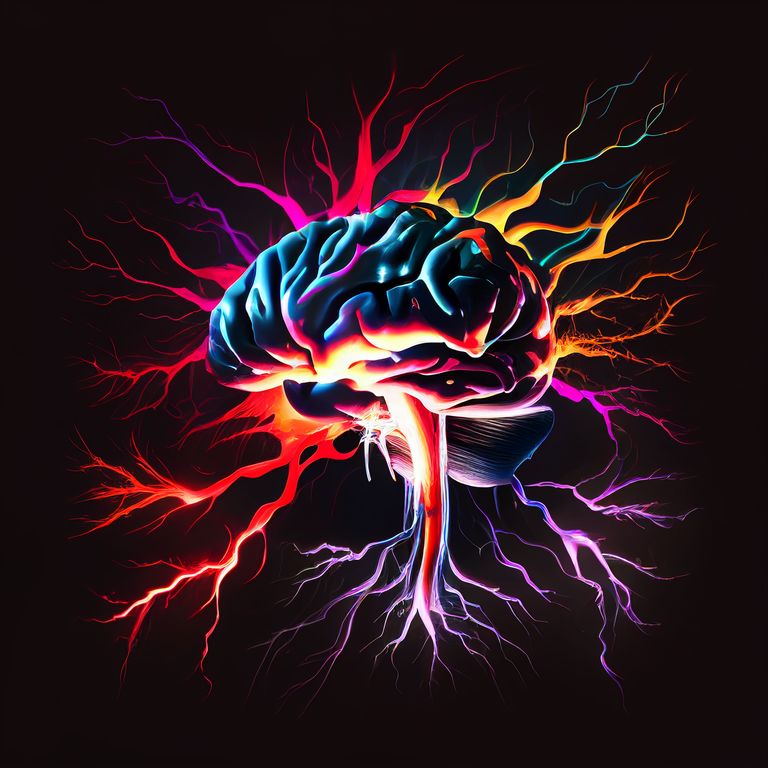 (AI picture generated by Mafu Fuma)
(AI picture generated by Mafu Fuma)The aftermath of a seizure can be a confusing and disorienting experience. Mentally I feel confused and disoriented trying to remember what happened. Physically, I feel exhausted and weak, like I just ran a marathon. My muscles ache and I may bruise or cut from falling during the seizure.
Emotionally I feel a mixture of relief and embarrassment. Relief that the seizure is over and I'm still alive and relatively unharmed. Embarrassment, because seizures can be frightening and disturbing for those who witness them, feeling like a burden or a spectacle.
Living with epilepsy has greatly changed my life in every way. For example, I have had to adjust my daily routine and activities to minimize the risk of having a seizure. I've had to pay more attention to my diet, sleep, and stress levels, as all of these factors can affect my seizure threshold.
Unfortunately, I also had to give up certain activities and hobbies that were very close to my heart and used to be a lot of fun. One hobby I unfortunately had to give up was lightpainting. I was passionate about painting with light in the dark and was also very involved in the scene. In the formation as "Aurora Movement" we organized the International Lightpainter Meetup "Lightpainters United". I produced a documentary series called The Path Of Light about the scene and was the first lightpainter on a cryptobased blogger platform that tried to attract all lightpainters worldwide to Hive (Steem at that time). My commitment could not have been greater, but then came my epilepsy and with it the great depression that I can no longer do all this with all my heart. Grief and anger went hand in hand, but I had to accept that I was no longer capable of dancing through the darkness with blinking flashlights and colored lights to get a nice lightart picture. I needed to leave all of that behind. I needed a psychologist for the first time in my life. It's just a crappy feeling when the thing you love doing the most is also the thing that scares you the most. After hours of talking, I was put on antidepressants to somehow finally deal with it.
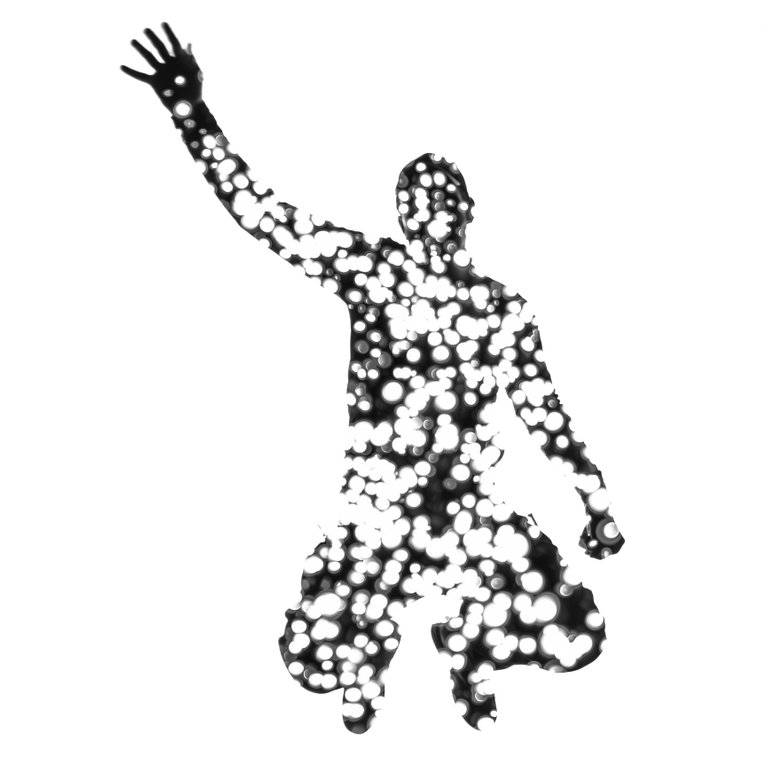 (Lightpainting by Mafu Fuma)
(Lightpainting by Mafu Fuma)Despite all the challenges of living with epilepsy, I have since learned to adapt and find ways to cope. For me, that meant getting support from family, friends, and medical professionals who understood my condition and could give me advice and encouragement. It also meant taking care of my mental health by going to support groups and taking other self-care steps. But it also meant that I had to become indifferent to some things in my life that were previously an important part of my life, and that is still the hardest part today.
One of the most important lessons I've learned from living with epilepsy is the importance of self-care. When no one understands you because most people are unfamiliar with the effects of the disease and treatment, seeking help from those around you or getting understanding can be discouraging. It can also be daunting to navigate the complex world of epilepsy treatment and care, but it is important to be an active participant in your own health care. Ask questions, do your own research, and advocate for your needs and preferences
Do you also suffer from epilepsy?
Living with epilepsy can be challenging and it is important to have a supportive community to turn to. If you're comfortable with it, sharing your experiences with others who also have epilepsy can be a great way to feel less alone and gain insights and perspectives that you may not have considered before.
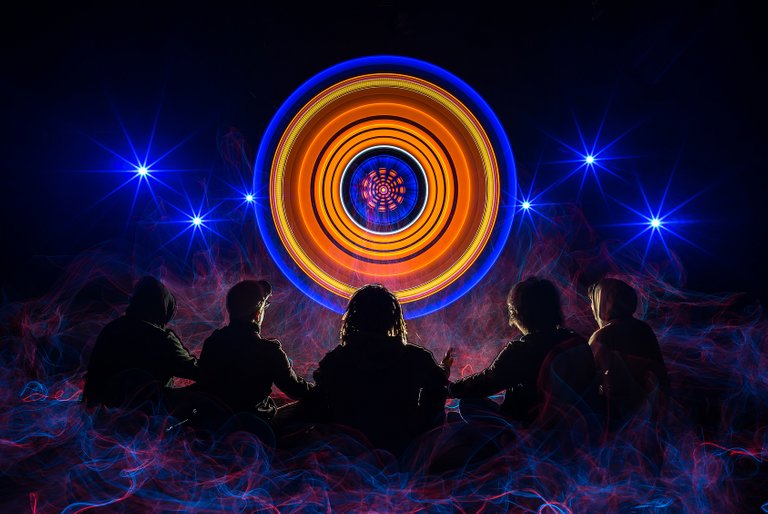 (Lightpainting by Mafu Fuma)
(Lightpainting by Mafu Fuma)From my own experience I can say that the disease and the personal burden it causes leads to changes in character that are initially not understandable for those around you. Don't close yourself off. Try to talk openly about it, otherwise you will only burden yourself even more than is already the case and your environment will then also take distance from you because they cannot understand your behavior.
If you are rather introverted and unable to talk about it then you should consider reaching out to local epilepsy support groups or online communities where you can connect with others who also share their experiences. You may also want to speak to a therapist or counselor who has experience working with people with epilepsy. They can help you process your feelings and develop coping strategies.
Remember that everyone's experience of epilepsy is different, but by sharing it we can better understand the disease and how it is affecting other people's lives.
I wish you all the best on your way.
Closing words:
I would like to thank all the people who stood by me in my most difficult times of life. There were times when I didn't understand my own actions and you still stood by my side. I am deeply grateful to you for that. Thank U!
I am a father and live alone with my 9-year-old son. If anyone has given me strength, it is you, my son. Thank you that you exist. I love you with all my heart!
I would also like to thank some hive activists who encouraged me with the "Shine Light On Mental Health" campaign to write about my condition.
@naturalmedicine, @garybilbao, @arcange, @riverflows and @acidyo
Thank you all very much!
Geistesblitz - Mein Leben mit Epilepsie
 (AI Bild generiert von Mafu Fuma)
(AI Bild generiert von Mafu Fuma)Es ist nun schon 4 Jahre her. Ich fiel einfach um und lag mit Zuckenden Beinen und Armen am Boden. Ärztliche Diagnose: Verdacht auf Epilepsie.
Ein einziger Anfall bedeutet aber nicht, dass man gleich ein Epileptiker ist. Für eine Epilepsiediagnose sind in der Regel mindestens zwei Anfälle ohne bekannten Auslöser (unprovozierte Anfälle) erforderlich, die mindestens 24 Stunden auseinander liegen.
Ich hatte keine Erinnerung an meinen Anfall und keine Verletzung, somit wollte nicht glauben das es passiert war, aber kurz darauf folgte der 2. Anfall und jemand machte ein Foto. Ich musste mich meiner neuen Realität stellen. Ich bin ein Epileptiker.
Epilepsie ist eine neurologische Störung, die durch wiederkehrende Anfälle gekennzeichnet ist und das Leben eines Menschen stark beeinträchtigen kann. Als jemand, der nun selber seit 4 Jahren an Epilepsie leidet, weiß ich, wie schwierig es sein kann, mit dieser Krankheit und den damit verbundenen psychischen Problemen umzugehen.
Es ist wirklich schwer, mit der Unberechenbarkeit der Anfälle umzugehen, und es beeinträchtigt auch die Fähigkeit, zu arbeiten, soziale Kontakte zu pflegen und sein Leben frei zu gestalten. Manchmal habe ich das Gefühl, dass die Leute nicht verstehen, was ein Epileptiker durchmachen muss und das führt oft dazu, dass man sich noch mehr isoliert fühlt. Dies ist der Grund warum ich diesen Artikel schreibe. Um meine Krankheit selber besser zu verarbeiten und vielleicht wird sich die Einstellung der Bevölkerung gegenüber der Krankheit Epilepsie auch ein bisschen verändern, denn die Meinungen in den Köpfen basiert weitestgehend auf Unwissenheit und Vorurteilen.
Leider ist Epilepsie derzeit nicht Heilbar und die Behandlungsmethoden für Epilepsie beschränken sich auf Medikamente, die durch die Regulierung der elektrischen Aktivität im Gehirn Anfälle verhindern sollen. Das richtige Medikament zu finden, ist jedoch ein Prozess des Ausprobierens, da unterschiedliche Medikamente bei verschiedenen Menschen unterschiedliche Nebenwirkungen haben können, die sich auf die psychische Gesundheit auswirken. Einige Medikamente können beispielsweise Müdigkeit, Depressionen und starke Stimmungsschwankungen hervorrufen, was es noch schwieriger machen kann, mit den Herausforderungen der Epilepsie fertig zu werden.
 (AI Bild generiert von Mafu Fuma)
(AI Bild generiert von Mafu Fuma)Als jemand, der im Laufe der Jahre mehrere verschiedene Epilepsie Medikamente ausprobieren musste, weiß ich aus erster Hand, wie frustrierend es sein kann, mit den Nebenwirkungen umzugehen. Manchmal kann es sich wie ein Kompromiss zwischen der Kontrolle der Anfälle und der Aufrechterhaltung einer guten psychischen Gesundheit anfühlen. Wenn ich nicht genau auf die Regelmäßigkeit der Tabletteneinnahme alle 12 Stunden achte, habe ich schon mit Angstzuständen, Depressionen, Trauer, oder Wutanfälle zu kämpfen, die durch die Unvorhersehbarkeit der Anfälle noch verstärkt werden können.
Die Angst vor einem "Grand Mal" Anfall ist immer gegenwärtig, denn die Folgen davon sind unabsehbar. Im besten Fall liegst Du nur zuckend auf dem Boden. Eine Gehirn Erschütterung ist nicht selten, aber vielleicht bekommst Du aber einen Hirnschlag und liegst danach im Koma. Vielleicht beißt Du dir auf die Zunge und erstickst daran. Alles ist denkbar, denn im Moment des Anfalls hast Du keine Kontrolle mehr. Das Gehirn hat einen Kurzschluss und schaltet in dem Moment ab. Oft bin ich erst im Krankenhaus wieder aufgewacht und bekam dann mitgeteilt das ich wieder einen Anfall hatte von dem ich selber nichts mitbekommen hatte. Nur das Loch im Kopf, die durchgebissene Wange, oder die Verletzung am Ellenbogen gab mir einen Hinweis darauf das ich wohl wieder eine „Grand Mal“ Anfall hatte. Wiedermal.
 (AI Bild generiert von Mafu Fuma)
(AI Bild generiert von Mafu Fuma)Die Nachwirkungen eines Anfalls können eine verwirrende und desorientierende Erfahrung sein. Geistig fühle ich mich verwirrt und desorientiert und versuche mich daran zu erinnern, was passiert ist. Körperlich fühle ich mich erschöpft und schwach, als wäre ich gerade einen Marathon gelaufen. Meine Muskeln schmerzen, und ich kann Prellungen oder Schnitte davon haben während des Anfalls zu fallen.
Emotional empfinde ich eine Mischung aus Erleichterung und Verlegenheit. Erleichterung, dass der Anfall vorbei ist und ich noch lebe und relativ unverletzt bin. Verlegenheit, weil Anfälle für diejenigen, die sie miterleben, beängstigend und beunruhigend sein können, wobei das Gefühl entsteht eine Last oder ein Spektakel zu sein.
Das Leben mit Epilepsie hat mein Leben in jeder Hinsicht stark verändert. Ich musste zum Beispiel meinen Tagesablauf und meine Aktivitäten anpassen, um das Risiko eines Anfalls zu minimieren. Ich musste mehr auf meine Ernährung, meinen Schlaf und mein Stressniveau achten, da all diese Faktoren meine Anfallsschwelle beeinflussen können.
Ich musste leider auch bestimmte Aktivitäten und Hobbys aufgeben, die mir sehr am Herzen lagen und früher sehr viel Spaß gemacht haben. Ein Hobby was ich leider aufgeben musste war Lightpaining. Ich habe leidenschaftlich gerne mit Licht in der Dunkelheit gemalt und war in der Szene auch sehr engagiert. In der Formation als "Aurora Movement" haben wir das Internationale Lightpainter Meetup "Lightpainters United" Veranstaltet. Ich habe eine Dokumentationsreihe namens The Path Of Light über die Szene Produziert und habe, als erster Lightpainter auf einer Cryptobased Blogger Plattform, versucht weltweit alle Lightpainter zu Hive zu locken (Damals noch Steem). Mein Engagement hätte nicht größer sein können, aber dann kam meine Epilepsie und damit auch die große Depression das ich all das nicht mehr mit ganzem Herzen machen kann. Trauer und Wut gingen Hand in Hand, aber ich musste akzeptieren, dass ich nicht mehr dazu in der Lage bin mit blinkenden Taschenlampen und bunten Lichtern durch die Dunkelheit zu tanzen um ein schöne Lichtkunstfoto zu kreieren. Ich musste all das hinter mich lassen. Ich brauchte das erste mal in meinem Leben einen Psychologen. Es ist einfach nur ein scheiß Gefühl, wenn das was Du am liebsten machst, dir gleichzeitig die Größte Angst macht. Nach stundenlangen Gesprächen, bekam ich dann auch Antidepressiva verschieben um irgendwie endlich damit zurecht zu kommen.
 (Lightpainting by Mafu Fuma)
(Lightpainting by Mafu Fuma)Trotz all der Herausforderungen, die das Leben mit Epilepsie mit sich bringt, habe ich inzwischen gelernt, mich anzupassen und Wege zu finden, damit umzugehen. Für mich bedeutet das, dass ich mir Unterstützung aus Familie, von Freunden und medizinischem Fachpersonal geholt habe, die meine Erkrankung verstehen und mir Rat und Ermutigung geben können. Es bedeutete auch, dass ich mich um meine psychische Gesundheit kümmere, indem ich zu Selbsthilfegruppen andere Maßnahmen zur Selbstfürsorge ergreife. Aber es bedeute auch, das mir manche dinge in meinem Leben egal werden mussten die vorher ein wichtig Teil meines Lebens waren und das ist bis heute noch der schwerste Teil.
Eine der wichtigsten Lehren, die ich aus meinem Leben mit Epilepsie gezogen habe, ist die Bedeutung der Selbsthilfe. Wenn keiner einen Versteht weil die meisten Menschen mit den Auswirkungen der Krankheit und der Behandlung nicht vertraut sind, kann es entmutigend sein Hilfe in seinem Umfeld zu suchen, oder Verständnis zu bekommen. Es kann auch entmutigend sein, sich in der komplexen Welt der Epilepsiebehandlung und -pflege zurechtzufinden, aber es ist wichtig, sich selber aktiv an der eigenen Gesundheitsversorgung zu beteiligen. Fragen zu stellen, eigene Nachforschungen anzustellen und sich für seine Bedürfnisse und Präferenzen einzusetzen.
Leidest Du auch an Epilepsie?
Das Leben mit Epilepsie kann eine Herausforderung sein, und es ist wichtig, eine unterstützende Gemeinschaft zu haben, an die man sich wenden kann. Wenn Du dich damit wohlfühlst, kann der Austausch deiner Erfahrungen mit anderen, die ebenfalls an Epilepsie leiden, eine großartige Möglichkeit sein, sich weniger allein zu fühlen und Einsichten und Perspektiven zu gewinnen, die Du zuvor vielleicht nicht in Betracht gezogen hast.
 (Lightpainting by Mafu Fuma)
(Lightpainting by Mafu Fuma)Aus eigener Erfahrung kann ich sagen, dass die Krankheit und die dadurch hervorgerufene persönliche Belastung zu charakterlichen Veränderungen führt die für dein Umfeld erstmal nicht zu verstehen ist. Verschließe dich nicht und versuche offen darüber zu reden, ansonsten belastet man sich selber nur noch stärker als es schon der Fall ist und auch dein Umfeld wird dann Abstand von dir nehmen weil Sie deine Zustände nicht nachvollziehen können.
Bist Du eher in dich gekehrt und unfähig darüber zu reden, dann solltest Du es erwägen dich an lokale Epilepsie-Selbsthilfegruppen oder Online-Communities zu wenden, wo Du dich mit anderen austauschen kannst, die auch Ihre Erfahrungen teilen. Vielleicht möchtest Du auch mit einem Therapeuten oder Berater sprechen, der Erfahrung in der Arbeit mit Menschen mit Epilepsie hat. Sie können dir helfen, deine Gefühle zu verarbeiten und Bewältigungsstrategien zu entwickeln.
Denke daran, dass jeder Mensch andere Erfahrungen mit Epilepsie hat, aber indem wir uns miteinander austauschen, können wir die Krankheit besser verstehen und erfahren, wie es sich auf das Leben der anderen Menschen auswirkt.
Ich wünsche dir alles Gute auf deinem Weg.
Schlusswort:
Ich möchte mich bei allen Menschen bedanken, die mir in meinen schwersten Lebenszeiten zur Seite standen. Es gab Zeiten wo ich mein handeln selber nicht verstanden habe und ihr seit trotzdem an meiner Seite geblieben. Dafür bin ich euch zutiefst Dankbar.
Ich bin Vater und lebe mit meinem 9-jährigen Sohn alleine. Wenn mir jemand Kraft gegeben hat dann Du mein Sohn. Danke das es dich gibt. Ich liebe dich von ganzem Herzen.
Zudem möchte ich mich auch bei einigen Hive Aktivisten bedanken, die mich ermutigt haben, im Rahmen der "Shine Light On Mental Health" Kampagne, über meine Krankheit zu schreiben.
@naturalmedicine, @garybilbao, @arcange, @riverflows und @acidyo
Euch allen vielen Dank!
Thank you for sharing your story!
Hi and welcome to Hive. I keep an eye out for Brits and can add you to the #BritList. You may want to do an introduction post so people know something about you.
Hi, I am completely new here and to Hive.
I am still learning and once I am confident enough my next step to introduce myself.
Also thank you for the recommendation.
Take your time to get settled in. You can see what others are posting about themselves. It's up to you how much you give away.
I'm glad you took the time to read it. Thank U!
Herzlichen Dank, dass Du Dich entschlossen hast, Deine Erfahrungen mit Epilepsie mit uns zu teilen. Eine liebe Freundin von mir leidet an einem Gehirntumor und epileptische Anfälle gehören leider ebenfalls dazu. Sie hat mit unterschiedlichen Medikamenten und Dosierungen zu kämpfen gehabt, denn wie Du richtig schreibst, bei jedem wirkt es sich anders aus. Ich finde es Klasse, dass Du trotz aller Herausforderungen mutig weiter machst und Deine Passion für Lightart nun auch auf anderen Wegen zum Ausdruck bringst. Gib niemals auf, NIEMALS!
Danke dir für dein Feedback. Das darüber Schreiben hat mir echt gut getan.
A very emotional testimony about this desease. Keep up the good work my friend, this new chapter of your life will be full of joy for sure.
Sharing means caring, or also pastoral care, because it does me good to talk about it and maybe it also helps others.
Hellow sorry to read this my friend be strong, it Is not the end of tour life, by the way what medicine did you try AND which one get the better result, i am sure that @acidyo and @azircon would be very interesting in this invaluable information, thanks a Lot.
Best regard
Shure its not the end of my life, but it was a beginning of a new one. Atm I take Levetiracetam and Lamotrigin. A mixture of both works best for me.
!ALIVE
!VSC
!PGM
!HBIT
!LOLZ
@oscarps has sent VSC to @mafufuma
This post was rewarded with 0.1 VSC to support your work.
Join our photography communityVisual Shots
Check here to view or trade VSC Tokens
Be part of our Curation Trail
@oscarps ha enviado VSC a @mafufuma
Éste post fue recompensado con 0.1 VSC para apoyar tu trabajo.
Únete a nuestra comunidad de fotografía Visual Shots
Consulte aquí para ver o intercambiar VSC Tokens
Se parte de nuestro Trail de Curación
@mafufuma! You Are Alive so I just staked 0.1 $ALIVE to your account on behalf of @oscarps. (6/10)
The tip has been paid for by the We Are Alive Tribe through the earnings on @alive.chat, feel free to swing by our daily chat any time you want.

Congratulations @mafufuma! You have completed the following achievement on the Hive blockchain And have been rewarded with New badge(s)
Your next payout target is 5000 HP.
The unit is Hive Power equivalent because post and comment rewards can be split into HP and HBD
You can view your badges on your board and compare yourself to others in the Ranking
If you no longer want to receive notifications, reply to this comment with the word
STOPCheck out our last posts:
Support the HiveBuzz project. Vote for our proposal!
Congratulations @mafufuma! You received a personal badge!
You can view your badges on your board and compare yourself to others in the Ranking
Check out our last posts:
Support the HiveBuzz project. Vote for our proposal!